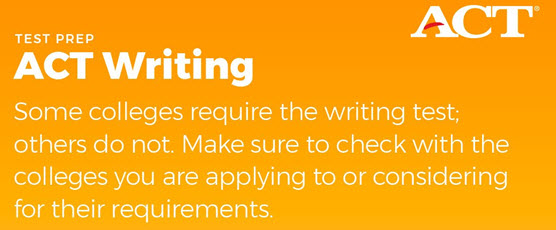
The ACT was created by University of Iowa professor Everett Franklin Lindquist in 1959 as alternative test to the SAT. The test from ACT, Inc. is taken by millions of students every year. It is accepted by all U.S. colleges although not all colleges require the Writing Test. The optional Writing Test was added to the ACT in 2005.
How Does the Writing Test Work
The 40-minute essay test features a writing prompt and asks students to describe a complex issue and present three different perspectives. You will write your essay in pencil.
Why Does This Test Exist?
The ACT was designed to complement the English and readings tests. ACT, Inc. says on its prep page for the test that the Writing Test cannot be taken without first completing all four multiple-choice tests in the same session. It sounds as if they want to wear out your brain first before making you write the essay. ACT, inc. says the writing test is kept optional because postsecondary institutions have varying needs. You don't have to take it if the colleges you are applying for don't require it.

Image: ACT, Inc.
Colleges Will Have Access to Your Written Essay
Your essay from the ACT Writing Test will be online and accessible by high school and college administrators. The ACT says, "Yes. The high school and colleges to which ACT reports your scores will be able to view an image of your essay online. The image of your essay will remain available for them to access for up to one year after you graduate from high school."
How to Prepare
The best way according to ACT, Inc. is to practice writing. This sounds obvious but you can improve essay writing skills with practice. They also suggest becoming familiar with current issues and developing your own opinions about them. You also need to understand the issues and be able to be make arguments that support your opinions. Think of the issues in the news today. They include climate change, immigration, taxes, drug costs, bullying, the opioid epidemic, gun violence, etc. Any one of these is a potential essay topic.
The best way to practice is to write essays on current issues yourself and go over them with friends and teachers. This way you can learn from any mistakes you are making. Practicing writing under a time constraint is also a good idea. This way the pressure won't bother you nearly as much on exam day.
ACT, Inc. offers a sample test prompt here about intelligent machines. The prompt is six sentences long.
Writing Test Scoring
The ACT Writing Test is a separate score from your ACT composite score. You will get five different scores for the ACT Writing Test. The main score is writing score with a range of 2-12. It is an average of your four domain scores. You will also get a 2-12 score for each of the four domains: Ideas and Analysis, Development and Support, Organization, and Language Use and Conventions. Your essay is read by two different readers who each assigned a 1 to 6 score. These scores are added together to come up with the 2-12 range.
For a more detailed look at what the readers are looking for in your essay, check out the ACT Writing Test Scoring Rubric. It lists what will get you a score of 1 to 6 for each of the domains. By reading this you can see how it is easy to avoid the low scores by practicing and improving your essay writing skills, particularly by developing strong arguments and writing essays that are well organized. It also shows that very good essays are required to score a 5 or 6 in each domain from each reviewer. This is probably why the average score is between 6 and 7 out of 12. A post on Prep Scholar has more details about the average score range. The ACT sample prompt also page also offers sample essays and scoring explanations.
Here's a video from the ACT on scoring. Specific information about the Writing Test score begins around the 4:55 mark.
Retaking the Test
ACT, Inc. says some students do take the test twice. They offer the following advice: "Many students test twice, once as a junior and again as a senior. You should definitely consider retesting if you had any problems during testing, such as misunderstanding the directions, or feeling ill. You may also want to consider retesting if you don't believe that your scores accurately represent your abilities, especially if you see a discrepancy between your ACT scores and your high school grades, or if you have subsequently completed coursework in the areas covered by the ACT."


